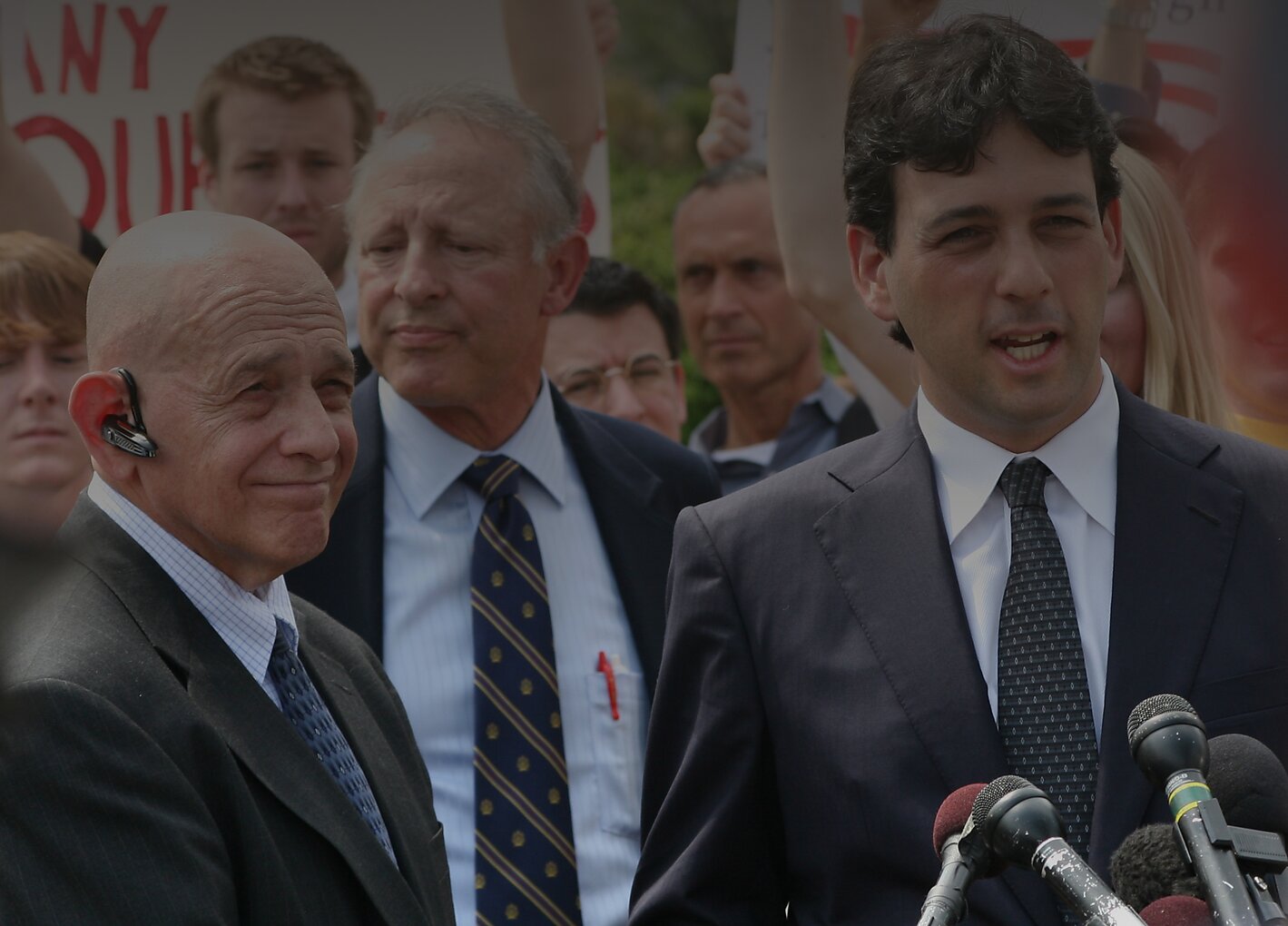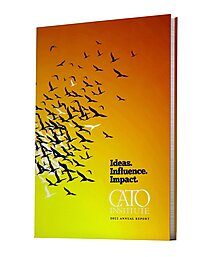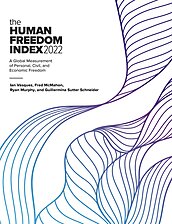Ideas. Influence. Impact.
“Little progress can be made by merely attempting to repress what is evil. Our great hope lies in developing what is good.”
–Calvin Coolidge

The Health of the Nation
Cato led the charge for free-market health care reforms long before the days of Obamacare. Our work helped spur the creation of market-driven reforms such as health savings accounts (HSAs). With the launch of an initiative, Make HSAs Work for Everyone, director of health policy studies Michael F. Cannon is educating the public on how the tax code violates patients’ rights and increases health care costs while working with policymakers to expand HSAs in a way that restores those rights and makes health care more accessible.
Cannon and Dr. Jeffrey Singer authored multiple op-eds showing state officials that they can free employers and individual consumers from Obamacare’s costliest hidden taxes by allowing them to purchase health insurance from U.S. territories, which were exempted from Obamacare’s worst regulations. Restoring the right of consumers to choose their own health insurance will make it more affordable and could even reduce premiums.
Keeping Up with the Jones Act
Cato’s work to dismantle the Jones Act continued in 2022 as a remarkable number of dilemmas were caused by this disastrous law, most notably the energy crisis facing northeastern states and Puerto Rico’s attempts to recover from Hurricane Fiona. Research fellow in the Herbert A. Stiefel Center for Trade Policy Studies Colin Grabow saw victories come from his relentless focus on ending the Jones Act. Grabow and Cato were cited in multiple New York Times articles regarding the complications caused by the Jones Act, and CBS reporter David Begnaud did a 30-minute live conversation on Instagram with Grabow that received more than 75,000 views.
Traitors!
It’s not every day you find a government document calling for Cato Institute employees to be charged with treason. A story published in The Dispatch detailed the contents of internal emails from the U.S. Maritime Administration obtained by a Freedom of Information Act request. Near the end of the 41‐page document was a set of recommendations related to a March 2020 meeting of the Marine Transportation System National Advisory Committee’s International Shipping Subcommittee. Among them: “Charge all past and present members of the Cato and Mercatus Institutes with treason.”
Protecting Civil Liberties
In the more than 50 years that the Freedom of Information Act (FOIA) has been on the books, it has helped open Americans’ eyes to how their government works in practice. It has been an invaluable source for providing some transparency to Americans whose civil liberties are threatened by their government, and for organizations like Cato that fight to protect those liberties. It is perhaps for this reason that the agencies and departments of the executive branch that are subject to the FOIA have persistently attempted to thwart its effective implementation. Senior fellow Patrick G. Eddington spearheaded an effort to deter- mine how many times the FBI had violated its own rules by conducting surveillance operations on civic organizations, media outlets, and political candidates or parties. After initial denials by the FBI, Cato filed a lawsuit demanding the release of the records.
In January 2022, the FBI began releasing reports of misconduct. Those reports revealed more than 700 violations. The size and scope of the FBI’s abuse was so shocking that Congress decided to intervene, and Eddington was also able to assist Rep. Jamie Raskin (D- MD) and Rep. Nancy Mace (R‑SC) with submitting a request to the Government Accountability Office to investigate the FBI’s use of “assessments”—de facto investigations that do not require evidence of criminal activity. That independent investigation is ongoing.
This is not the first time that Cato has exposed warrantless surveillance by the FBI, and it likely won’t be the last, as we continue leading the fight to hold government agencies accountable to the Constitution and rule of law. Eddington’s timeline of First and Fourth Amendment violations is updated regularly, and Cato will continue to bring public attention to the government’s infringement of citizens’ civil rights.
A Global Voice for Freedom
The Cato Institute is a global think tank. Through the leadership of vice president for international studies Ian Vásquez, Cato’s Center for Global Liberty and Prosperity promotes a better understanding of the benefits of freedom and free-market policy solutions to countries around the world, especially developing countries. The center positions Cato as a leading reference for the international liberty movement, which looks to Cato’s research, commentary, and comprehensive measurements of global freedom to inform the work of freedom advocates in their own countries.
The 2022 Human Freedom Index, co-published by Cato and the Fraser Institute in Canada, is the most comprehensive measurement of freedom around the world and underscores how catastrophic the pandemic was for global freedom in 2020, the most recent year with complete data. The Index tracks a worrying trend of decreasing personal, civil, and economic freedom in 148 of the 165 jurisdictions ranked, a decline experienced by 94 percent of the world’s population. The United States has fallen in the rankings since 2000, when it was 6th; today, the country is 23rd.
The foundations of economic freedom are personal choice, voluntary exchange, and open markets. Without exchange and entrepreneurial activity coordinated through markets, modern living standards would be impossible. The 2022 Economic Freedom of the World Report, copublished in the United States by Cato and the Fraser Institute, finds that global economic freedom declined significantly in the wake of the COVID-19 pandemic, affecting 146 jurisdictions in the index. Taking into account indicators on the size of government, property rights, sound money, free trade, and regulation, the United States was the seventh-most-free nation.
A Tribute to Robert A. Levy

Liberty’s Vanguard: A Tribute to
Robert A. Levy
There are few people in the 45-year history of Cato who have done more for—or meant more to—the Institute and the cause for liberty than longtime Cato Sponsor and the chairman emeritus of Cato’s board of directors Robert (Bob) Levy.
Levy began his career with Cato as a senior fellow and eventually served for 26 years, including 15 on the board of directors and 14 as its chairman. During his tenure as Cato’s chairman, Levy steered the Institute with vision and decisiveness through formidable challenges. Most importantly, his leadership ensured that Cato remained independent and true to its mission.
Levy’s principled approach to stewarding the organization helped define Cato’s culture. No matter how heated the fights for liberty became, Levy maintained his characteristic sense of calm, good humor, and adherence to the values for which Cato stands—qualities that continue to inspire Cato’s management.
In 1996, Levy applied to work at Cato’s Center for Constitutional Studies. He had sold his successful financial services business, earned a law degree while in his 50s from George Mason University—graduating as class valedictorian—and clerked for two years on the DC District and Circuit courts.
He was offered a position as a legal expert at Cato, and from that day forward, Cato and Bob Levy were synonymous.
By the time Levy began working at Cato, he was already a longtime Cato Sponsor, but he felt he could make the biggest impact on the future of liberty by working alongside Cato’s legal scholars.
“Cato always operated outside the political process, addressing issues rather than candidates or campaigns. And it was always consistent—never compromising on its advocacy of limited government, individual liberty, and the rule of law. Those characteristics are what make Cato successful, and I knew that’s where I wanted to learn and apply my law degree,” Levy said.
In his first few years at Cato, Levy became a prominent figure in a widely publicized legal battle: the global tobacco settlement of 1998 in which tobacco companies paid out $365 billion, supposedly to reimburse for smoking-related illnesses and deaths—partly in exchange for a shield from antitrust litigation. Through widely disseminated studies, testimony, media appearances, and op-eds, Levy educated the public and policymakers on how the settlement benefited tobacco companies by protecting them against competing startups while ultimately shifting the cost to smokers—the very people it was intended to help—by allowing the major tobacco companies to raise the price of cigarettes without fear of competition.
Despite negative feedback from some in the tobacco industry and threats to withdraw support from Cato if Levy persisted in criticizing the settlement, Cato’s CEO at the time, Ed Crane, declared that Cato would provide public commentary on the litigation regardless of the effect on donations to the Institute.
“That’s just one example of Cato’s consistency and independence,” Levy said. “So many think tanks find themselves compromised by financial repercussions, but Cato has never succumbed to that problem.”
In 2002, Levy embarked on a historic battle to defend the constitutional right to bear arms. Joining with Cato’s now senior vice president for legal studies Clark Neily, and local attorney Alan Gura, Levy began planning a lawsuit to strike down the handgun ban in Washington, DC.
Levy called the law “an outright prohibition that transparently violates constitutional guarantees.” His self-financed Second Amendment lawsuit faced considerable opposition, but ultimately Levy’s insight and commitment led to the landmark 2008 case Heller v. District of Columbia in which the Supreme Court established that the Constitution protects an individual’s right to keep and bear arms.
“Every step of the way, Bob’s influence and support was there. The case never would have happened and never would have been successful without his participation,” Neily said.
Levy’s influence is felt throughout the libertarian world through his leadership on several boards, his significant philanthropy, and his collegiality—a trait that draws people to him and unites communities of liberty-lovers. Within the ecosystem of liberty organizations, the entry point for many is through a relationship with Bob Levy.
Aptly, the legal center where Levy initially applied for a job in 1996 now bears his name—the Robert A. Levy Center for Constitutional Studies—following a generous anonymous contribution made in his honor in 2017.
Beyond devoting much of his life and career to Cato’s mission, Levy recently created a transformational planned gift that ensures his—and Cato’s—legacy will live on for many years to come.
Longtime Cato Sponsor and the chairman emeritus of Cato’s board of directors
Each of our policy areas has a strategy to generate ideas, influence, and impact—the products that define Cato’s significance and allow it to be a powerful voice on behalf of liberty and peace. In the years ahead, we’ll continue to make strategic investments in critical policy areas, including entitlement reform, tax and budget policy, and state-based economic issues. We will expand our government affairs and outreach teams to increase our influence on both the federal and state levels. We’ll build a more robust talent pipeline for the next generation of libertarian leaders by enhancing and growing our student programs. And we will continue investing in marketing, communications, and digital capabilities so our voice in deciding the direction of our country will be louder than ever.
Continuous improvement is essential to overcoming liberty’s challenges, but it’s also a critical part of the responsibility we have to our Sponsors. Voluntary contributions from individuals like you allowed us to meet this moment in American history. Through your continued generosity and partnership, Cato will not only defend against new assaults on our freedom but continue advancing libertarian ideas and policy solutions that allow all Americans to flourish.
The support of Cato’s Sponsors allows us to reach new and larger audiences each year. We’re so grateful to our community of Sponsors, who also recognize the urgency of this moment and our commitment to meet it.
It’s exhilarating to have you with us. Without you by our side, none of our work would be possible.
Previous Chapter
Report Home

Download the Full Annual Report



